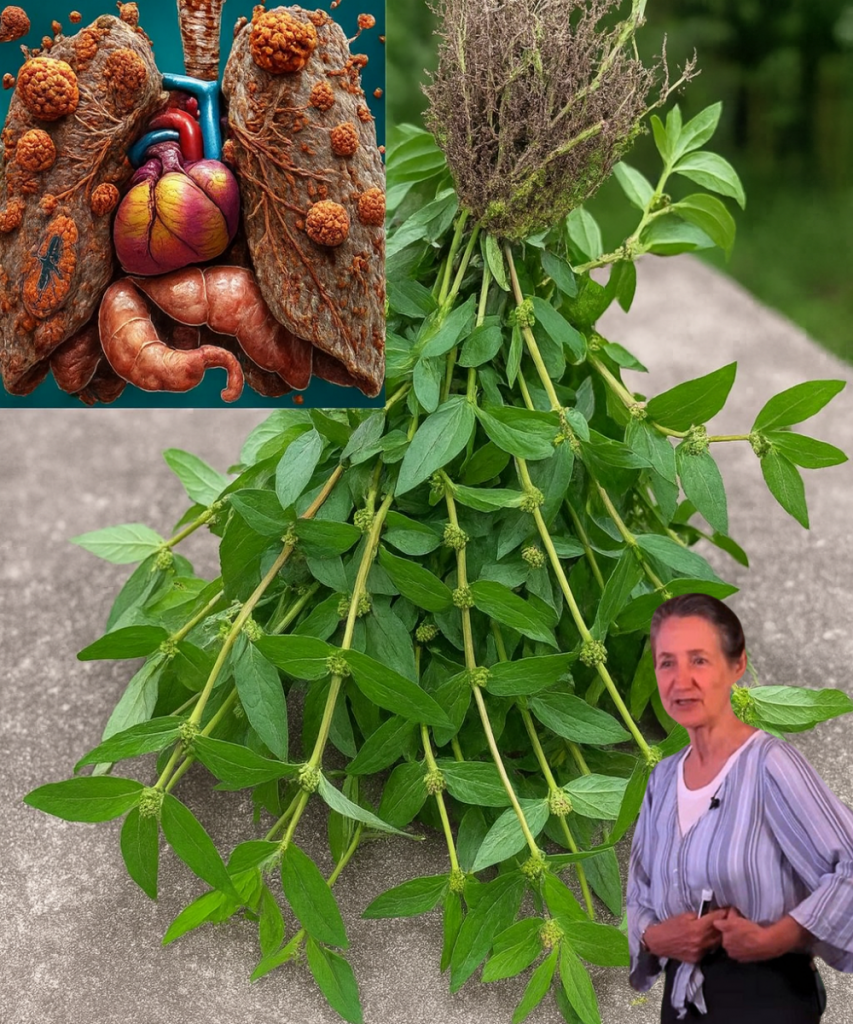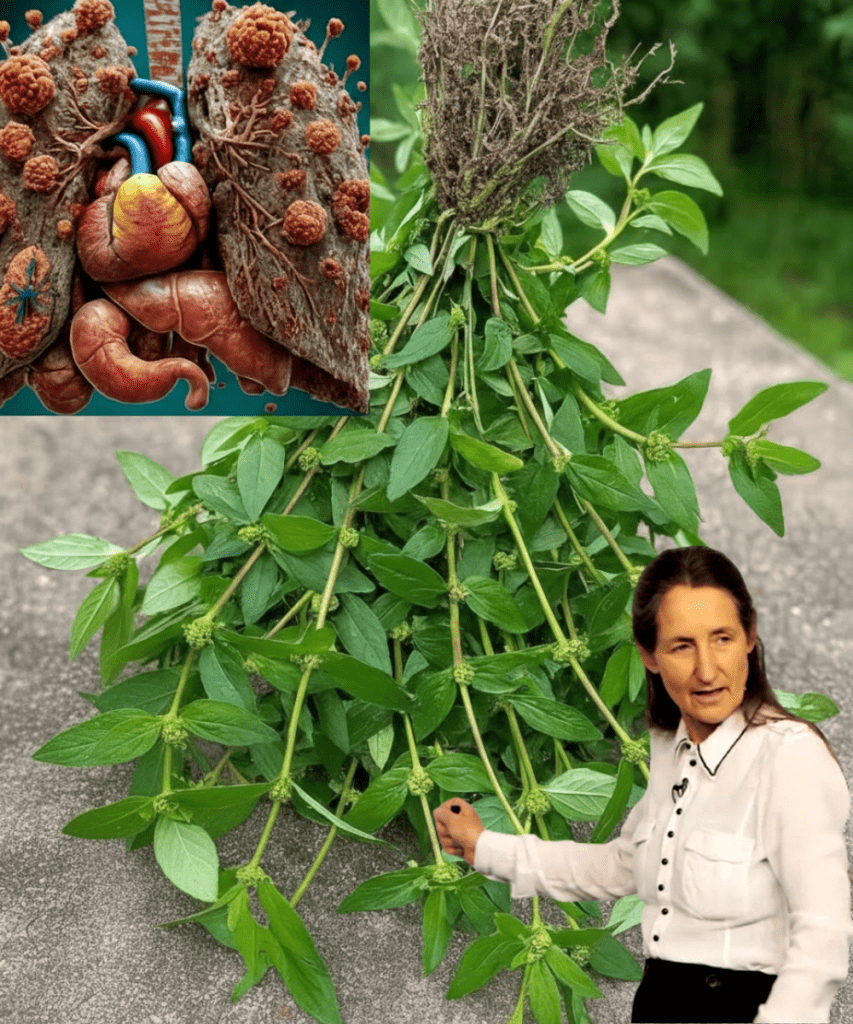In the relentless search for wellness, we often overlook the most accessible treasures. While we invest in expensive supplements and exotic herbs, one of the world’s most powerful medicinal plants is likely thriving right under our noses, dismissed as nothing more than a stubborn, scruffy weed. This plant is Euphorbia hirta, a small, hairy herb with a profound global history of healing. Known from the dense jungles of the Amazon to the dusty roadsides of India and the sidewalks of bustling Manila, Euphorbia hirta is a true botanical paradox.
For centuries, traditional healers across Africa, Asia, and Latin America have revered this plant, giving it evocative names like Asthma Weed, Snakeweed, and Tawa-Tawa. They instinctively knew what modern science is only now beginning to validate: this humble herb is an exceptional source of powerful bioactive compounds—an arsenal of flavonoids, tannins, terpenoids, and saponins that deliver proven antimicrobial, anti-inflammatory, and antioxidant effects.
This is not just another story about folk remedies. This is an exploration of a deeply rooted, scientifically relevant natural medicine. This comprehensive guide will compel you to look at your surroundings with new eyes. We will dive deep into the 10 most impressive, research backed health benefits of Euphorbia hirta, explore its critical role in conditions like asthma and dengue recovery, and detail the safe, traditional methods of use. Prepare to unlock the green gold hidden in your backyard and discover why this “weed” is perhaps the most underestimated wonder in the world of natural health.

🌿 What Is Euphorbia Hirta? A Botanical Introduction
Euphorbia hirta belongs to the large spurge family (Euphorbiaceae) and is characterized by its slender stems, small green leaves often tinged with red, and its notable fine, hairy covering. It is an annual herb that adapts easily to disturbed soil, making it a ubiquitous presence in tropical and subtropical climates worldwide.
Traditional Names and Cultural Significance
The varied names assigned to Euphorbia hirta across different cultures speak volumes about its diverse medicinal applications:
- 🌬️ Asthma Weed: This name is common across various regions where the plant is traditionally brewed into a tea or decoction specifically to soothe bronchial spasms, ease coughing, and provide relief for conditions like asthma and bronchitis due to its bronchodilating properties.
- 💉 Tawa-Tawa (Philippines): This is perhaps its most famous and clinically studied traditional use. During outbreaks of Dengue Fever, Tawa-Tawa tea became a widespread herbal remedy used to support platelet count and hydration—critical factors in patient recovery.
- 🐍 Snakeweed: In folklore, this name suggests its traditional application as a counter remedy for snake bites, a testament to its perceived powerful detoxifying and healing properties.
Despite its scruffy appearance and common status, Euphorbia hirta is a deeply significant part of rural healthcare systems, acting as a frontline, accessible medicine for generations.
💊 The 10 Impressive Health Benefits of Euphorbia Hirta
The broad spectrum efficacy of Euphorbia hirta stems from its rich mixture of flavonoids, which act as anti inflammatories and antioxidants, and its tannins, which provide astringent and antimicrobial effects.
1. 🌬️ Supports Profound Respiratory Health
This is the plant’s defining therapeutic use globally. Its traditional use as Asthma Weed is validated by its ability to act on the smooth muscles of the airways.
- Bronchodilating Action: Compounds in the herb possess antispasmodic and bronchodilating properties, helping to relax constricted bronchial tubes. This action can ease wheezing, reduce the severity of coughing fits, and improve airflow for individuals with asthma, chronic coughs, and bronchitis.
- Soothing Mucosal Lining: When brewed as a warm tea, it provides a soothing, anti inflammatory effect on the irritated mucosal lining of the throat and respiratory passages.
2. 🩸 Aids in Dengue Recovery and Platelet Support
The Tawa-Tawa use in the Philippines during dengue outbreaks remains one of the most compelling examples of traditional medicine being adopted en masse.
- Platelet Support: While not a cure for the virus, the tea is widely believed to help support the recovery of platelet count in dengue patients. Platelets are vital for blood clotting, and their severe reduction is a primary risk factor in dengue fever.
- Hydration: Beyond specific compounds, the tea ensures patients maintain adequate hydration, a crucial element of recovery from any fever and viral infection.
3. 🛡️ Potent Antimicrobial Power
The presence of tannins and various phenolic acids gives Euphorbia hirta a formidable defense system that translates to human benefits.
- Broad Spectrum: Extracts of the plant show significant antibacterial and antifungal activity against a range of common pathogens. This validation supports its traditional use in cleaning and protecting wounds and treating topical infections.
- Fighting Infections: Its internal antimicrobial properties are believed to contribute to its efficacy in treating infectious diarrhea and other internal ailments.
4. 🔥 Reduces Chronic Inflammation and Swelling
Chronic pain and disease are often rooted in persistent inflammation. The anti inflammatory arsenal of the plant targets this core issue.
- Flavonoid Action: The flavonoids in the herb help to neutralize pro inflammatory markers, easing the swelling and discomfort associated with systemic inflammatory conditions like arthritis and rheumatism.
- Pain Management: Applied as a compress or consumed as a decoction, it aids in reducing localized swelling, supporting greater comfort and mobility.
5. 🚽 Superior Digestive Support and Relief
For immediate relief from acute digestive distress, Euphorbia hirta has long been the remedy of choice.
- Astringent Action: The tannins in the herb give it a natural astringent quality, which helps to tighten and dry out irritated tissues in the gut lining. This is highly effective in easing acute diarrhea and dysentery.
- Antispasmodic: It possesses compounds that act as antispasmodics, helping to relax the smooth muscles of the digestive tract, thus alleviating painful stomach cramps and intestinal colic.
6. ✨ Boosts Skin Health and Wound Healing
Whether tackling common blemishes or aiding in the recovery of minor injuries, the plant offers powerful topical benefits.
- Topical Defense: The sap or crushed leaves are traditionally applied directly to the skin to treat warts, boils, fungal infections, and minor wounds. Its antimicrobial and astringent properties clean the wound and promote drying and healing.
- Anti-Itch: The soothing, anti-inflammatory compounds also help to calm irritated skin and reduce persistent itching.
7. 🩸 Balances Blood Sugar • Metabolic Potential
Emerging research is focusing on the plant’s potential role in metabolic health, giving it new relevance in the modern diet.
- Glucose Regulation: Preliminary studies suggest that certain extracts may possess compounds that help in the regulation of blood glucose levels. This property makes Euphorbia hirta a plant of interest for its potential supportive role in managing metabolic disorders and blood sugar balance.
8. 💊 Provides Natural Pain Relief
As a broad acting traditional analgesic, the plant was relied upon to ease various types of discomfort.
- Alleviating Discomfort: Decoctions have been traditionally used to provide natural relief from various acute pains, including persistent headaches, toothaches, and menstrual discomfort (dysmenorrhea). The underlying anti inflammatory action is key to this benefit.
9. 💧 Supports Urinary Health
The leaves and stems are known for their gentle, cleansing action on the urinary system.
- Diuretic Effect: Euphorbia hirta acts as a natural diuretic, promoting increased urine flow. This diuretic effect is helpful in flushing out the urinary tract, which may assist in easing discomfort associated with minor urinary tract issues and promote overall cleansing of the kidneys.
10. 💪 Enhances Immunity and Cellular Defense
By neutralizing key internal threats, the plant supports the body’s long term resilience.
- Antioxidant Strength: The rich presence of flavonoids and phenols provides powerful antioxidant activity. These compounds work at a cellular level to strengthen the body’s overall defense against oxidative stress, a major contributor to aging and cellular dysfunction, thereby enhancing general immunity.

🍵 How to Use Euphorbia Hirta Safely
The key to utilizing this plant effectively is adherence to tested, traditional preparation methods and cautious dosage.
Traditional Preparations for Wellness
- Herbal Tea (Decoction): This is the most common internal use. Boil a handful of fresh or dried leaves and stems in water for 10 to 15 minutes. Strain and drink moderately. This method is typically used for respiratory issues, fevers, and digestive support.
- Topical Application: For wounds, boils, or fungal infections, the simplest method is to crush the fresh leaves to create a paste or utilize the sap directly. Apply the paste as a compress to the affected area.
- Infusion for Fevers: For supportive care during feverish conditions (like dengue), a lighter infusion (steeping the leaves rather than boiling them heavily) is often preferred to maintain hydration and gently introduce the beneficial compounds.
Safety and Responsibility: Use with Caution
While Euphorbia hirta is a gentle, commonly used folk remedy, its potency requires respect and adherence to safety guidelines.
- Dosage Matters: As with any potent herb, dosage is crucial. Excessive use can potentially lead to undesirable side effects such as nausea, vomiting, or stomach upset. Always start with a small, conservative dose.
- Pregnancy and Breastfeeding: The plant contains certain compounds that can affect hormone levels or have other systemic effects. Pregnant or breastfeeding women should avoid internal use of Euphorbia hirta unless explicitly advised and monitored by a qualified healthcare practitioner.
- Consultation: If you are managing a serious chronic condition (like diagnosed asthma, diabetes, or a severe infection), this herb should only be used as a supportive supplement to professional medical treatment, not as a replacement for it.
💡 The Final Verdict: Your Backyard Treasure
Euphorbia hirta is more than just a ubiquitous weed; it is a profound testament to the power of nature’s accessible medicine. From soothing the spasms of asthma to aiding recovery from fever and calming digestive turmoil, its 10 validated benefits make it a true, undervalued treasure.
The next time you walk past this small, hairy plant, remember the potent, centuries old pharmacy it represents. Knowledge is power, and in the case of Backyard Green Gold, that power can unlock a surprising path to health and well being.
Will you take a moment today to identify this powerful plant and explore its potential benefits safely? 🌱
Deep Research
Video
🍌 Hình ảnh
Canvas









